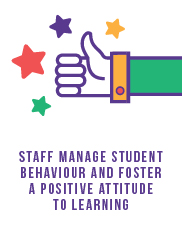Behaviour for Learning: 10 top tips
 1) Before the lesson even begins… Greet students with positivity whilst doing 50/50 at the door to welcome them.
1) Before the lesson even begins… Greet students with positivity whilst doing 50/50 at the door to welcome them.
2) Become the broken record… If you establish clear routines and expectations with your classes, you will limit the chances of poor behaviour escalating.
3) The power of the pause… The unbroken, unrelenting reminding about these low-level disruptions will result in the reminders becoming redundant: it is now time to replace with a tactical pause. This is for you to stop whatever you are saying or doing. Usually the young person displaying the low-level disruption or holding up the lesson will get the message and stop whatever they’re doing. Failing this, a faint whisper from a fellow student who has the message works equally well.
 4) Never say please… When you give an instruction never say please as this is a request. Instead, always follow an instruction with thank you as this shows an expectation that it must be done.
4) Never say please… When you give an instruction never say please as this is a request. Instead, always follow an instruction with thank you as this shows an expectation that it must be done.
5) Relationships… This is not about trying to befriend the students or being the ‘cool’ teacher; positive and effective student-teacher relationships are formed through time, sincerity and trust.
6) Give students the responsibility… Students have to reflect on their actions openly and honestly. Give a class time to discuss what needs doing to make things right and how to stop something from happening again. How can others in the class help? This is where corrective conversations are key.
7) Home-school communication… To foster a good working relationship with parents, find out how it’s easiest for them to communicate with you. Some prefer a phone call but others find it easier by e-mail.
8) Own your classroom… Own your classroom, walk around and be confident. The relationships that we model to students and with other staff may be the only positive behaviour that the children see. Apologise if you make a mistake – you are modelling this for the child or young person and this will support you to build trust and respect. This, of course, extends to the corridor and any space you occupy!
9) Stick to your routines… Have your set classroom habits formed with crystal clear expectations and don’t deviate away from them, use time to reinforce these. You will soon see the benefits of the children knowing what to expect and where they stand. Invest time in setting up your routines and planning for behaviour. Talk about routines and expectations regularly, the start of a new term is a good time for this.
10) Praise… The classroom is a place filled with funny and positive interactions, and your students will all feel appreciated in different ways.
Please get in touch with either of us if you’d like us to drop in to a particular class or student that’s causing you concern or if you’d like to meet to brainstorm strategies to use with particular groups. If you’d like some behaviour for learning coaching or to develop CPD for your department, we’re here to support!
We hope you have a great week.
Mark and Jo